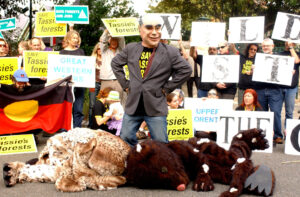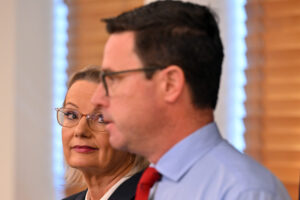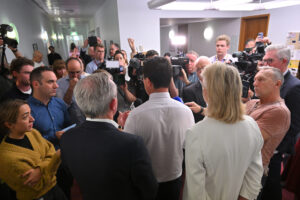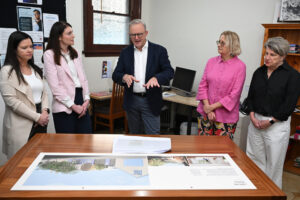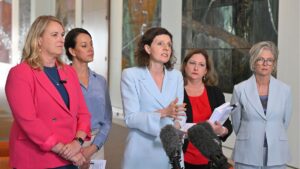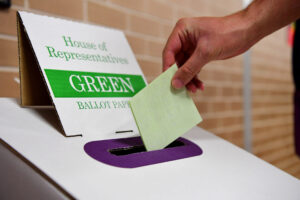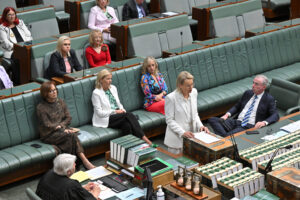February 2026
One Nation’s rise gives progressive voters unexpected power in ‘safe’ Coalition seats
The rise of One Nation creates a surprising opportunity for progressive voters.
January 2026
Does the government understand its own hate laws?
The government passed new gun control and hate speech legislation in a special parliamentary sitting, but what impact will they have on Australian democracy?
September 2025
No right to know?
The government’s proposed changes to freedom of information laws represent a “serious attack” on Australia’s democracy, according to former Senator Rex Patrick.
EXPLAINER: Howard government puts Albanese government to shame on freedom of information
The Albanese Government announced today they want to charge people a fee for putting in a freedom of information request.
August 2025
EXPLAINER: What are personal staff, and why do they have Clive Palmer contemplating another political campaign?
Clive Palmer, the billionaire coal miner who funded the Palmer United Party, United Australia Party and Trumpet of Patriots, is considering another political run.
July 2025
South Australia’s leap into the unknown with political finance changes
July 1 marked a dramatic change in how political parties and candidates are funded in South Australia.
A matter of preference
Labor won big and the Coalition got “smashed”, but the major parties have never been more reliant on preferences.
June 2025
Major parties have never relied more on preferences
At the 2025 federal election, the Albanese Labor Government won over 55% of the two-party preferred vote. The two-party preferred vote, called 2PP, measures whether Australians preferred their Labor candidate or their Liberal–National Coalition candidate. 55% of the 2PP is the party’s best result since 1943. This high 2PP vote disguises a relatively low first-preference
For major party leaders, the Greens, independents and minor parties are the closest threat
Nearly a quarter of all seats in the federal parliament are now “non-classic” seats, where first and second is no longer a fight between the two major parties.
Gender parity closer after federal election but “sufficiently assertive” Liberal women are still outnumbered two to one
Now that the dust has settled on the 2025 federal election, what does it mean for the representation of women in Australian parliaments? In short, there has been a significant improvement at the national level. When we last wrote on this topic, the Australian Senate was majority female but only 40% of House of Representatives
The system is working, but big parties must heed voters and engage with minor parties
Tasmanians keep voting for a power-sharing parliament over the wishes of the major parties.
Hearing voices: why the Nats should be watching their backs
The community independent movement did not begin in Sydney or Melbourne, but in the bush.
Australians should be proud of our preferential voting, but there is an alternative
A record number of Australians voted for independents and minor parties at the most recent federal election election.
May 2025
The election exposed weaknesses in Australian democracy – but the next parliament can fix them
Australia has some very strong democratic institutions – like an independent electoral commission, Saturday voting, full preferential voting and compulsory voting. These ensure that elections are free from corruption; that electorate boundaries are not based on partisan bias; and that most Australians turn out to vote. They are evidence of Australia’s proud history as an
End of the LNP Coalition would makes this the largest crossbench in the post-WWII era
A large crossbench might seem unusual, but before WWII they were commonplace in Australia.
Second-term Albanese Government can escape the Liberal veto
While the exact numbers are not settled, what is clear is that the Albanese Labor Government has won a decisive majority in the Parliament.
Election entrée: Dark money and your money pay for most of the political ads you’re seeing
At this stage of the election, you have no doubt seen plenty of political ads.
April 2025
Election entrée: think three-year terms are too short? Spare a thought for generations past.
Complaints about the brevity of three-year parliamentary terms are common in Australia.
The cruel housing hoax
Amy Remeikis and Bill Browne discuss the federal election campaign so far, the performance of the media, and how preferential voting actually works.
Who votes with whom? Beware claims that use voting records to argue politicians have similar views
Sky News says community independent MP Allegra Spender supports more Coalition motions than Greens motions. But They Vote for You says Spender votes with Greens MPs more often than Coalition MPs. That both those claims are made about the same person is proof that voting comparisons are fraught. It is just as confusing when it
Is there a benefit to coming first on the ballot?
Today the AEC promised “bingo cages, blindfolds and balls” – in other words, they finalised the candidates for the upcoming federal election, and randomly decided which order they will be displayed on the ballot paper.
Postal vote applications – the number 1 source of complaints during election campaigns
Have you received a postal vote application form in the mail?
Did you wonder why it was bundled with material promoting a political party?
Or why the return address was a political party HQ, not the Australian Electoral Commission (AEC)?
Now that there are no safe seats – the ‘bellwether seat’ is no more.
Media analysis shows that the decade from 2007 was the bellwether era, but that era has now passed
Labor repeats support for territory Senator increase – revisits missed opportunity from last term
Labor says it will push to double the number of senators for the ACT if re-elected. Finance Minister Katy Gallagher told ABC Canberra: “it’s certainly something we all support”.
Full preferential voting means you can’t waste your vote
Full preferential voting is a proud Coalition reform – one that benefits every political persuasion Compulsory voting and full preferential voting make up the backbone of Australian democracy, and protect us from voter suppression and disengagement seen in other countries. We owe both to the parties of the centre-right, what would become the Liberal–National Coalition.
Liberal Party will miss its decade-long target for female representation
At the National Press Club today, Shadow Treasurer Angus Taylor was asked about how few women the Liberal Party is nominating as candidates.
February 2025
“Stitch up” Labor and Coalition Deal on Electoral Reform
Last night, Liberal Senator Jane Hume announced they’d done a deal with the Albanese Labor Government on electoral laws – and some twelve hours later, it became law, having been rushed through both houses of Parliament. Labor’s compromises with the Coalition have worsened the bill even further: Instead of a disclosure threshold of $1,000, which
The major parties, not the independents are the big spenders at election time
The government says the electoral laws changes are about limiting big spending by independents, but community independents spent less per seat than the major parties at the 2022 federal election.
.Hands off our elections
Australia needs an electoral system that’s genuinely fair, not a two-tiered system that favours the major parties.
General Enquiries
Emily Bird Office Manager
mail@australiainstitute.org.au
Media Enquiries
Glenn Connley Senior Media Advisor
glenn.connley@australiainstitute.org.au




